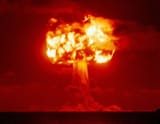>>63836511 (OP)
The real tactical problem with Nukes is that they don't do anything useful in a modern war. Hardening a target against the bomb is much easier than normies imagine it is, so achieving a military goal with a nuke is more challenging than just pointing it somewhere and letting loose.
Probably the most valuable thing you can do with a Nuke is take out productive industry. That's, naively speaking, what the point of bombing Hiroshima and Nagasaki specifically was: they were industrial centres for the Imperial Japanese Navy. Factories can't realistically be hardened in the way a bunker can, and building back from the total devastation of a nuclear bomb is a ludicrous proposition. Obviously, it will cause considerable psychological distress in the enemy on top of this of course.
Almost any other use case is either as a weapon of terror or as a weapon of total destruction. Nuking one city is not helpful to the war effort, all it will do is strike fear into your enemy's heartland (which is itself not that helpful, extensive studies on this were done during and after WW2 showing that total war didn't accomplish anything). Nuking every city on the other hand is extremely helpful, but you have to be willing to destroy them utterly. It's not a question of dropping a bomb so the enemy surrenders. The case of Japan is that Japan was already on its knees, but it was trying to hold out to negotiate a conditional surrender, not the completely unconditional one it ended up with post-Nagasaki.
So you're stuck in this logical quagmire where dropping one or two bombs is relatively ineffective but dropping hundreds of bombs is too effective.
Nukes are more of an existential threat to smaller countries, to be fair. A nation like Israel has good reasons to fear a handful of bombs, while on the other hand Russia and the US felt like they would need to send thousands at each other.



